John Baskin
- 1973
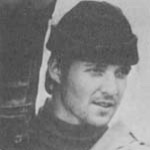
Fellowship Title:
- The Life and Death of a Small Ohio Village
Fellowship Year:
- 1973
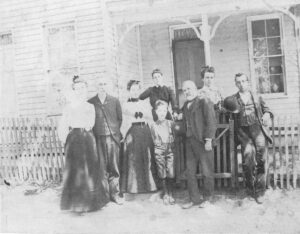
New Burlington, Ohio: When A Town Dies
John Harlan Pickin, A History
March 15, 1974 John Harlan Pickin’s great-grandfather walked from New Jersey to Ohio when farming country was still new. Caprice being the true nature of human delivery, John Pickin grows older in New Jersey now, and the distance is ever more awesome. He will never return to New Burlington, Ohio, because it is a dying village. Yet New Burlington, condemned in death to even more obscurity than it bore in life, remains the home of John Pickin in that particular way places of the mind and heart transcend all geography. photographs: Sarah Haydock (standing), James Haydock’s granddaughter, fishes in Anderson’s Fork: “Grandfather Haydock always said he was partly born and raised in New Jersey. He told us things today and we laughed tomorrow.” oval photograph is of Sarah’s aunt, Ruth Morgan: “She and my grandmother sat in the window and argued about who passed by on the pavement. It was their form of conversation.” above, Sarah’s niece, Eleanor. “My father,” said Eleanor, “told us that anyone who brought disgrace to the Haydock name would be
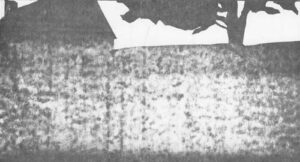
New Burlington, Ohio: A Country Diary
I have come to live in New Burlington’s last farm house, surrounded by white brick and clean silence. I have come here to understand its death, my life. Nothing is revealed. I consider Ross McDonald and Agatha Christie, all mystery in the telling, and resolution before a fortnight. For a time, before the death of Lawrence Mitchner, I shared the responsibility of lastness, which is not to be taken lightly. Across my orchard, behind the drawn shutters in Lawrence Mitchner’s house, I could see a blue glow in the heavy tangible weight of a winter’s night. Some say he watched television. Others said not. Not having a television set, I watch the seasons and the documentary of my neighbor’s existence, which takes place one mile to the south. My animals, however, outnumber my neighbors. The two sheep, Clyde and Lady Clyde, and I maintain an uncertain truce. I maintain also the water bucket and the hay maw. Clyde maintains his integrity: he will butt the hand that feeds him. I admire this, and so do
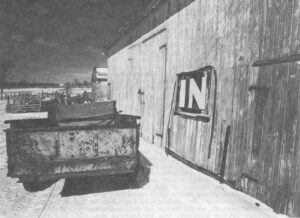
New Burlington, Ohio: When a Town Dies
The Coming of Machinery
September 30, 1973 The Coming of Machinery – I One must work, if not from taste then at least from despair. For to reduce everything to a single truth: work is less boring than pleasure. — Baudelaire It is said that the farmer’s best years were from 1910 until 1914. Those were the good years, when a precarious kind of symmetry existed. The farmer made 70 percent of what the urban worker made in those early four years of this green century. Soon after, he began to fall even further behind. And the alchemists of a new age reasoned accurately that the basic elements could be converted to gold. In nearby Dayton, even as the good Bishop Wright thundered blasphemy to such dreamers, his own blood betrayed him: his sons conquered gravity in a dusty bicycle shop, thereby promising the moon to men in their time. The agent of such thaumaturgy would be capitalism, a steel-ribbed hunk of a word the nation movers could use to prove themselves, like the disciplined circumstance of
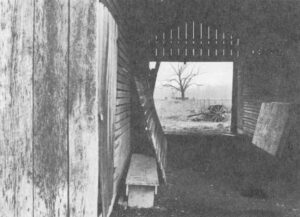
New Burlington, Ohio: When a Town Dies
The Plowmen
They, being commonly out of doors, heard whatever was in the wind. – Thoreau, Walden In the summer, the cornfields surround New Burlington with a startling density. In early August of a wet year, the stalks climb until the roads into the village disappear. Farm houses mire in a seasonal forest: green shingles, green stalks, green thoughts. In late August the silken plume on the ear darkens. The earth tilts under harvest weight. Frank Lundy’s heart leaps on green August mornings. Form and function meet in such dark bottomlands. The road that rises to the graveyard hill is east and west, but Frank Lundy’s corn rows run north and south. “You can drive by and look down the rows,” he explains. “I thought I could plow as straight a row as anybody in the country, you see. It showed well running north and south, gave a different look to the field, and made a very pretty picture. They would say at the bank: ‘I saw your cornfield….” His neighbor to the east, Albert McKay, shares
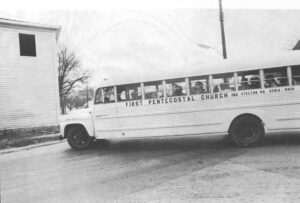
New Burlington, Ohio: When a Town Dies
Summer
July 10, 1973 It is an ordinary chair, of good mahogany and quiet cloth. In front of the rockers, the figured carpet is worn, an acquiescence to Mrs. Louie Wills’ passage through the seasons. The chair is the center of her existence, as if the rockers themselves absorb grief, loneliness, and age. From the chair, everything is equidistant: kitchen, bedroom, television, front porch and neighbors, even the minister of the Nazarene Church around the corner, whose bleak wrath in the warm months when windows are flung up bludgeons the center of the village like failure itself. Photo by Dan Patterson Louie Wills’ skin is like fine parchment; her hair the shape and color of the clean alabaster curl of a conch shell. She has been allowed that greatest of gifts, to grow old with grace. At 95, she hears and sees well and lives alone, taking care of herself and a one-eared cat which comes to the door and whispers curiously, like a rasp against soft metal, to be let in. If Louie Wills is
